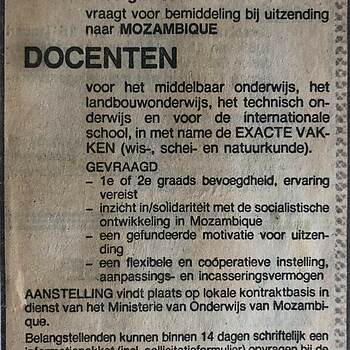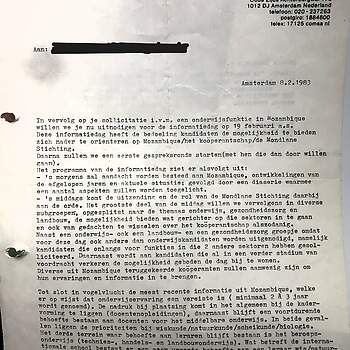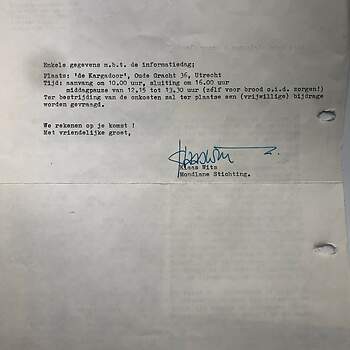Created from solidarity
Founded in 1969, EMS emerged from the Angola Committee in the Netherlands, which had been advocating for the independence of Portuguese African colonies. It was specifically established to support liberation movements across Portuguese-speaking Africa, with a strong focus on Mozambique. The foundation was named after Eduardo Mondlane, who was assassinated in 1969. His wife, Janet Mondlane, had requested that the organization play a more active role in aiding liberation movements, especially FRELIMO, the main independence movement in Mozambique. EMS became a key part of the broader solidarity movement that opposed NATO’s support for Portugal’s colonial wars (AHM (2005).
Throughout the early 1970s, EMS organized various campaigns, including “blanket campaigns” to collect goods for the liberated areas in Mozambique and other Lusophone African nations. These campaigns raised awareness in the Netherlands about the struggles in Africa and garnered Dutch support for the independence movements.
Several Dutch individuals supported the Liberation war and some of them decided to get the Mozambican citizenship at Independence.
Coordinating role
After independence, EMS became the main conduit for organizing Dutch aid to Mozambique. The foundation worked closely with the Dutch government, particularly Minister Jan Pronk, and played a strategic role in shaping the planning and direction of aid, ensuring that it aligned with FRELIMO’s goals. In 1984, it established an office in Maputo.
One significant task was recruiting “cooperantes”, Dutch volunteers with a socialist orientation who would work alongside FRELIMO and other organizations. These cooperantes provided vital support in various sectors of the country. EMS also maintained strong relationships with organisations like Dienst Over Grenzen (DOG), a Protestant volunteer organisation that worked alongside EMS in Mozambique.
Involvement in the Anti-Apartheid movement
In addition to its work in Mozambique, EMS was deeply involved in the anti-apartheid movement. Mozambique, under FRELIMO, hosted many members of the African National Congress (ANC) and provided a place for fighters and activists, such as Ruth First. Several cooperantes recruited by EMS (and DGIS and DOG), such as Klaas de Jonge, were directly involved in organizing resistance activities (book reference: ‘De Koerier van Maputo’, 2021).
Critical solidarity
Despite the close relationship between EMS and FRELIMO, EMS was not uncritical of the Mozambican government’s policies. One key issue was the Operação Produção (1981), a forced resettlement campaign. Under this program, unemployed urban dwellers in cities like Maputo and Beira were relocated to rural areas to work on state farms or in communal villages. EMS cooperantes witnessed the use of force during this operation and voiced their concerns. This led EMS to adopt a policy of “critical solidarity”, where they continued to support Mozambique's development but were openly critical of certain government actions and policies.
Another point of disagreement arose when FRELIMO chose to work with the International Monetary Fund (IMF), which promoted neoliberal economic policies. EMS, along with other solidarity organizations, was concerned that this would lead to the adoption of policies detrimental to the Mozambican population.
Transition and legacy
By the 1990s, the role of EMS evolved. After 1990, EMS gradually shifted from a solidarity organization to a regular development NGO, similar to many others in the sector. In 1995, as the Dutch Embassy gained more autonomy in managing development aid, EMS’s influential role in coordinating Dutch bilateral assistance to Mozambique began to diminish.
In 1997, EMS merged with like-minded organizations, including Komite Zuidelijk Afrika (KZA), to form the Netherlands Institute for Southern Africa (NIZA). NIZA later merged into ActionAid, a global development organization. EMS’s archives are now housed at the International Institute of Social History in Amsterdam.
A footnote
Additionally, EMS established the Werkgroep Waterbeheer (Working Group for Water Management) in 1978. This association focused on water management in Lusophone African countries, particularly Mozambique. It produced a quarterly publication, Eau Courante, and created a consultancy firm, SAWA, which operated in Maputo between 1995 and 1997, conducting studies on water and sanitation in peri-urban areas.
References/Further reading
The archives of the Eduardo Mondlane Stichting are brought to the International Institute of Social History, Amsterdam (https://iisg.amsterdam/en)
AHM Arquivo Histórico Moçambique and NIZA Nederlands Instituut voor Zuidelijk Afrika (2005). Brothers from the West. Solidarity in the Netherlands with Mozambique 1962 - 2005. Amsterdam: NIZA
Büscher Chris (2021). Water aid and trade contradictions: Dutch aid in the Mozambican waterscape under contemporary capitalism; PhD thesis University of London – SOAS
Holtland J.J. (2021). De koerier van Maputo, een Nederlander in de Zuid-Afrikaanse revolutie; Uitgeverij Podium Amsterdam (about Klaas de Jonge) [LINK follows]
Scholtens, H. (2018). 'Onafhankelijkheid nog maar het begin!' van solidariteit met antikoloniale strijd, naar betrokkenheid bij de socialistische wederopbouw van Mozambique. De Eduardo Mondlane Stichting als case study, 1969-1978. MSc Thesis, Universiteit van Amsterdam
Wit de, T. (2008). A Luta Continua? We blijven ze steunen. Relatie tussen Nederland en Mozambique 1973 - 1983. MSc Thesis, Universiteit Utrecht (no digital link found)
Original version 20/12/2024, D. Bouman


